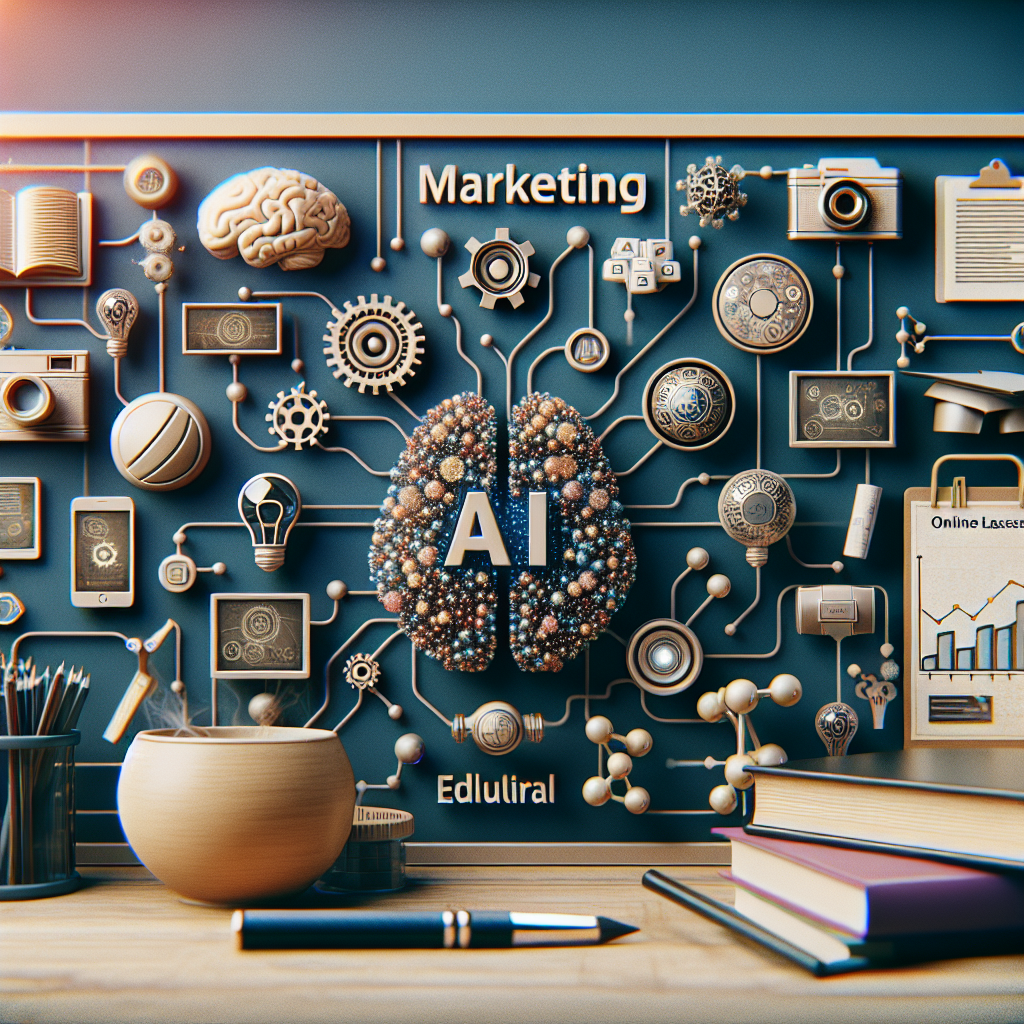Transforming Education and Marketing with AI
Welcome to this fascinating exploration of how AI is revolutionizing two essential aspects of our world – education and marketing. Part one of this blog post will explore top AI tools transforming the education industry, including OpenAI’s ChatGPT, Google’s BERT, Khan Academy’s EdTech tools, and many more.
Have you ever considered how AI can make educational content more engaging, personalized, and effective?
Moving from education, the second part covers how AI tools like HubSpot’s Marketing Hub, Grammarly, and Articoolo are enhancing marketing strategies. Imagine automating the analysis of customer data or predicting the performance of your content before it’s even published.
Curious about how to create an effective AI marketing strategy or best ways to promote AI-driven educational content? Well, I’ve got you covered in the final sections. Stay tuned!
Best AI for Creating Educational Content
OpenAI’s ChatGPT for Interactive Learning
OpenAI’s ChatGPT stands out for interactive educational content. It can create engaging Q&A sessions, offer step-by-step explanations, and provide personalized tutoring.
- Creates realistic dialogue for learner engagement
- Provides instant, accurate feedback
- Generates examples relevant to the topic
Educators can integrate ChatGPT to make lessons dynamic and responsive to student needs.
Google’s BERT for Contextual Text Understanding
Google’s BERT (Bidirectional Encoder Representations from Transformers) is a powerful AI for understanding the context within texts. This makes it excellent for generating:
- Summarized readings or notes
- Conceptual explanations based on context
- Assessment of reading comprehension
BERT’s capability to understand context makes it ideal for breaking down complex educational materials.
Khan Academy’s EdTech Tools
Khan Academy leverages AI tools designed to tailor educational experiences. Their AI system provides:
- Personalized learning paths
- Real-time feedback on performance
- Suggested practice problems
Students can learn at their own pace with recommended resources.
IBM Watson for Curriculum Development
IBM Watson’s AI capabilities can help in developing effective curricula by analyzing large datasets to identify:
- Gaps in current educational materials
- Effective teaching strategies
- Student performance trends
Watson enables customized educational solutions based on data-driven insights.
Data Table: AI Tools and Their Educational Features
| AI Tool | Features |
|---|---|
| ChatGPT | Interactive dialogues, Personalized tutoring, Q&A sessions |
| BERT | Contextual understanding, Summarization, Conceptual explanations |
| Khan Academy Tools | Personalized learning, Real-time feedback, Practice suggestions |
| IBM Watson | Curriculum analysis, Teaching strategy identification, Trend analysis |
Microsoft’s Azure Cognitive Services for Language Understanding
Microsoft’s Azure Cognitive Services focuses on natural language processing, making it suitable for:
- Generating quiz questions
- Building language-based assessments
- Creating interactive lesson plans
This tool can automate some of the content creation processes, enhancing the efficiency and quality of educational resources.
Quillbot for Writing Assistance
Quillbot is an AI that excels at paraphrasing and grammar checking. It can assist in:
- Rephrasing complex sentences
- Improving readability of study materials
- Ensuring grammatical accuracy
Quillbot helps make educational texts clear and comprehensible. For more information, check out this resource on Forbes.
Maximizing AI for Tailored Marketing Content
HubSpot’s Marketing Hub for Personalised Marketing
HubSpot’s Marketing Hub leverages AI technology to deliver personalized marketing based on user behavior. Here’s what you can benefit:
- Automated analysis of customer data
- Creation of segmented audience lists
- Delivery of custom content based on user behavior
By targeting customers more effectively, businesses can improve engagement and conversions.
MarketMuse for Content Optimization
MarketMuse is an AI-driven platform designed to optimize content for SEO. It delivers powerful insights such as:
- Keyword research and content briefs
- Assessment and improvement of content quality
- Strategic recommendations for content planning
These insights can give your content a competitive edge, enabling search engine visibility and higher user engagement.
Grammarly for High-Quality Written Content
Grammarly is a widely-used AI tool that helps enhance the quality of written content. It can provide important assistance with:
- Grammar and spelling check
- Contextual writing suggestions
- Improvement of tone and readability
Grammarly ensures that your content is polished, professional and clear, contributing to a better user experience.
AI Tools and Their Content Marketing Features
| AI Tool | Features |
|---|---|
| HubSpot’s Marketing Hub | Customer data analysis, Audience segmentation, Custom content creation |
| MarketMuse | Keyword research, Content quality improvement, Strategic content planning |
| Grammarly | Grammar check, Writing suggestions, Readability improvement |
Articoolo for Fast Content Creation
Articoolo uses AI to generate articles on a given topic in a matter of minutes. The tool can assist in:
- Generating search engine optimized content
- Saving time on article writing
- Creating high-quality blog posts
By automating content creation, Articoolo helps businesses achieve consistency and efficiency in their content marketing efforts.
Atomic Reach for Content Performance Prediction
Atomic Reach uses AI to predict the performance of your content before it’s published. It supports functions such as:
- Predictive content analytics
- Language analysis for optimum engagement
- Content scoring for performance prediction
Atomic Reach provides valuable foresight in content performance, enabling businesses to adopt proactive marketing strategies. For more details, visit this link to Forbes.com on how AI is transforming content marketing.
How to Create an AI Marketing Strategy
Identify Your Marketing Goals
Before implementing AI in your marketing strategy, establish clear goals. These can range from enhancing customer engagement to increasing conversion rates or boosting brand awareness. Clearly defined objectives will guide your AI tool selection and strategy deployment.
- Enhance customer engagement
- Increase conversion rates
- Boost brand awareness
Select the Right AI Tools
Choosing the appropriate AI tools is essential for effective implementation. Opt for tools that align with your objectives and can seamlessly integrate with your existing systems. Common categories include data analytics, content generation, and customer segmentation.
| Objective | Recommended AI Tools |
|---|---|
| Customer Engagement | HubSpot’s Marketing Hub, Intercom |
| Content Optimization | MarketMuse, Grammarly |
| Data Analytics | Google Analytics, IBM Watson |
Data Collection and Analysis
Data is the backbone of any AI-driven marketing strategy. Gather robust data from various sources like customer interactions, website analytics, and social media metrics. Use AI tools for data processing and insights generation to understand patterns and trends.
- Customer interactions
- Website analytics
- Social media metrics
Personalize Customer Interactions
AI enables personalized marketing campaigns by leveraging customer data to tailor messages and offers. Tools such as HubSpot’s Marketing Hub can segment your audience and automate personalized interactions, enhancing user experience.
- Automated segmentation
- Tailored messages and offers
- Enhanced user experience
Create and Optimize Content
Content remains king in marketing. Utilize AI tools like MarketMuse for keyword research and content planning, while Grammarly ensures your content is polished and professional. These tools enhance the quality and search engine optimization (SEO) of your content.
- Keyword research
- Content planning
- SEO enhancement
Implement Predictive Analytics
Predictive analytics can forecast future trends and customer behavior, allowing for proactive marketing strategies. Tools like IBM Watson can provide predictive insights, helping businesses to stay ahead of the curve.
- Forecast future trends
- Understand customer behavior
- Proactive marketing strategies
Monitor and Adjust
An AI marketing strategy isn’t a set-and-forget solution. Continuous monitoring and adjustment based on data analytics and performance metrics are essential. Tools like Google Analytics can help keep track of key performance indicators (KPIs) and inform necessary tweaks.
- Continuous monitoring
- Performance metrics
- KPIs tracking
Explore [Forbes](https://www.forbes.com/sites/forbestechcouncil/2020/12/11/content-marketing-with-artificial-intelligence-how-ai-is-changing-content-marketing) for more on how AI is revolutionizing content marketing.
Key Takeaways for Creating an AI Marketing Strategy
1. **Define Clear Objectives:** Start by identifying what you want to achieve with your AI marketing strategy.
2. **Choose Appropriate Tools:** Select AI tools aligned with your goals and existing systems.
3. **Focus on Data:** Collect comprehensive data for meaningful insights.
4. **Personalize Customer Experience:** Utilize AI for personalized messaging and offers.
5. **Optimize Content:** Use AI for content planning and SEO.
6. **Use Predictive Analytics:** Implement predictive tools for future-proof strategies.
7. **Adjust Continuously:** Monitor performance and adjust your strategies accordingly.
Best Ways to Promote AI-Driven Educational Content
Utilizing Social Media Platforms
Social media is a powerful channel to promote AI-driven educational content. Leveraging platforms like Facebook, Twitter, LinkedIn, and Instagram, you can reach a broad audience. Here’s what you can do:
- Create engaging posts and stories to showcase educational content
- Use targeted ads to reach specific demographics
- Participate in groups or communities relevant to your niche
Social media allows for interaction, enabling direct engagement with your audience, which can drive more interest back to your AI-powered educational tools.
Collaborating with Educational Influencers
Partnering with influencers who focus on education can amplify your reach. Look for educators, academicians, and content creators who have a strong following. This collaboration could involve:
- Sponsored posts or reviews of your AI tools
- Guest blog appearances or interviews
- Co-hosting webinars or online workshops
Influencer endorsements can build trust and credibility, making your AI-driven educational content more appealing to broader audiences.
Content Marketing and Blogging
Start a blog or create articles that highlight how AI improves the learning experience. Effective content marketing strategies include:
- Writing case studies showing successful AI implementations in education
- Creating “how-to” guides that explain the usage of your AI tools
- Publish educational whitepapers or research findings
These materials can be shared on platforms like Medium, LinkedIn, and on your website to attract organic traffic and establish authority in the educational space.
Webinars and Online Workshops
Hosting online events like webinars and workshops is an excellent way to demonstrate the effectiveness of AI-driven educational content. Consider organizing:
- Live demonstrations of the AI tools
- Interactive Q&A sessions with educators and developers
- Workshops for teachers to learn how to integrate AI into their curriculum
These events not only educate your audience but also provide a platform to collect feedback and improve your offerings.
Email Marketing
Email campaigns can keep your audience informed and engaged. Tailor your email marketing efforts to:
- Send newsletters featuring new AI tools and updates
- Highlight case studies and success stories
- Provide exclusive access to webinars and workshops
An effective email strategy can nurture leads and keep your educational content top-of-mind for your subscribers.
Search Engine Optimization (SEO)
Optimize your website and content for search engines to increase visibility. SEO strategies include:
- Using relevant keywords related to AI in education
- Creating backlink opportunities with respected educational websites
- Ensuring your site is mobile-friendly and loads quickly
Good SEO practices will help your content rank higher on search engine results pages, drawing more organic traffic.
Utilizing E-Learning Platforms
Offer your AI-driven educational content on popular e-learning platforms such as Coursera, Udemy, or Teachable. These platforms provide a ready audience of learners interested in cutting-edge educational tools. Key activities involve:
- Developing comprehensive courses featuring your AI tools
- Offering certification programs to add value
- Providing supplemental materials, such as eBooks and educational videos
These platforms can act as an additional marketing channel, attracting a diverse range of learners.
AI Tools and Features for Educational Content Promotion
| AI Tool | Promotional Features |
|---|---|
| HubSpot’s Marketing Hub | Automated email campaigns, Social media scheduling, Lead nurturing |
| Hootsuite | Social media management, Post scheduling, Analytics |
| Google Analytics | Data tracking, User behavior analytics, Conversion tracking |
| Zapier | Automated workflows, Integration of apps, Task automation |
| Mailchimp | Email marketing, Audience segmentation, A/B testing |
Leveraging these tools can help streamline your promotional efforts, making your AI-driven educational content more accessible and engaging for your target audience.
Conclusion: Harnessing AI for Educational and Marketing Advancements
Leveraging AI tools, such as OpenAI’s ChatGPT, Google’s BERT, Khan Academy’s EdTech Tools, IBM Watson, Microsoft’s Azure Cognitive Services, and Quillbot, unlocks significant potential for streamlining educational content creation and tailored learning experiences.
Similarly, harnessing AI capabilities in marketing with tools like HubSpot’s Marketing Hub, MarketMuse, Grammarly, Articoolo, and Atomic Reach result in targeted, high-quality, SEO-optimized content creation and predictive performance insights.
Implementing an efficacious AI marketing strategy involves clear objective setting, strategic tool selection, robust data collection and analysis, personalized customer interactions, predictive analytics, and continuous tracking and tweaking.
Moreover, it also means building on the symbiosis of AI-empowered education with strategic promotional approaches through social media, educational influencer collaborations, content marketing, online events, email marketing, SEO, and e-learning partnerships.
Frequently Asked Questions – FAQs
What are the benefits of using AI in education?
AI in education can offer personalized learning experiences, real-time feedback, and effective educational content, enabling students to learn at their own pace with resources tailored to their needs.
How can AI improve marketing strategies?
AI can enhance marketing strategies by providing data analysis, segmented audience lists, automated content creation, strategic content planning, and predictive content performance analytics, thus optimizing marketing efforts.
What is critical when implementing an AI marketing strategy?
Clear goals, the right tools, a focus on data, the personalization of the customer experience, content optimization, the use of predictive analytics and an adjustable approach based on monitoring and data analytics, are key.







